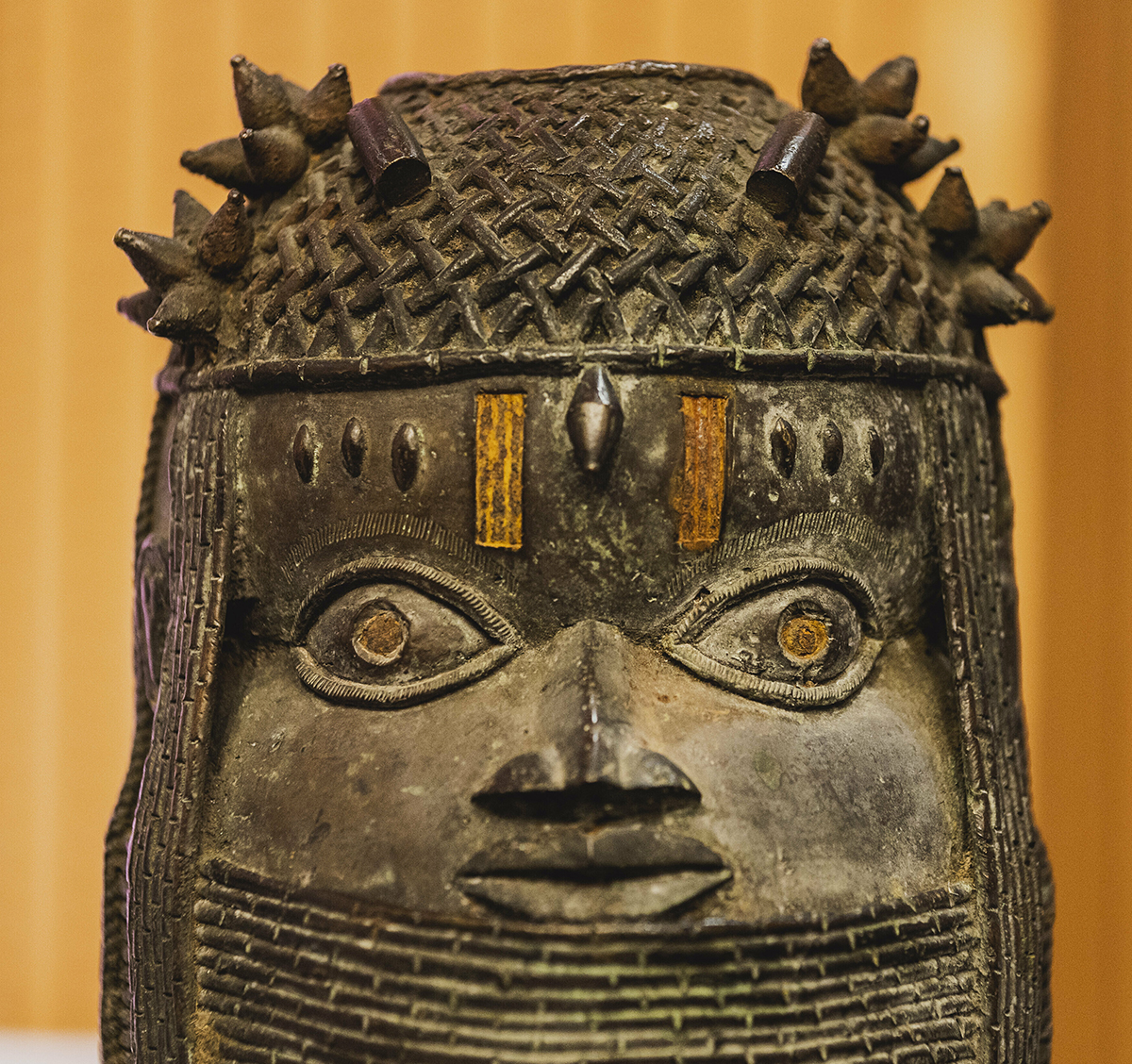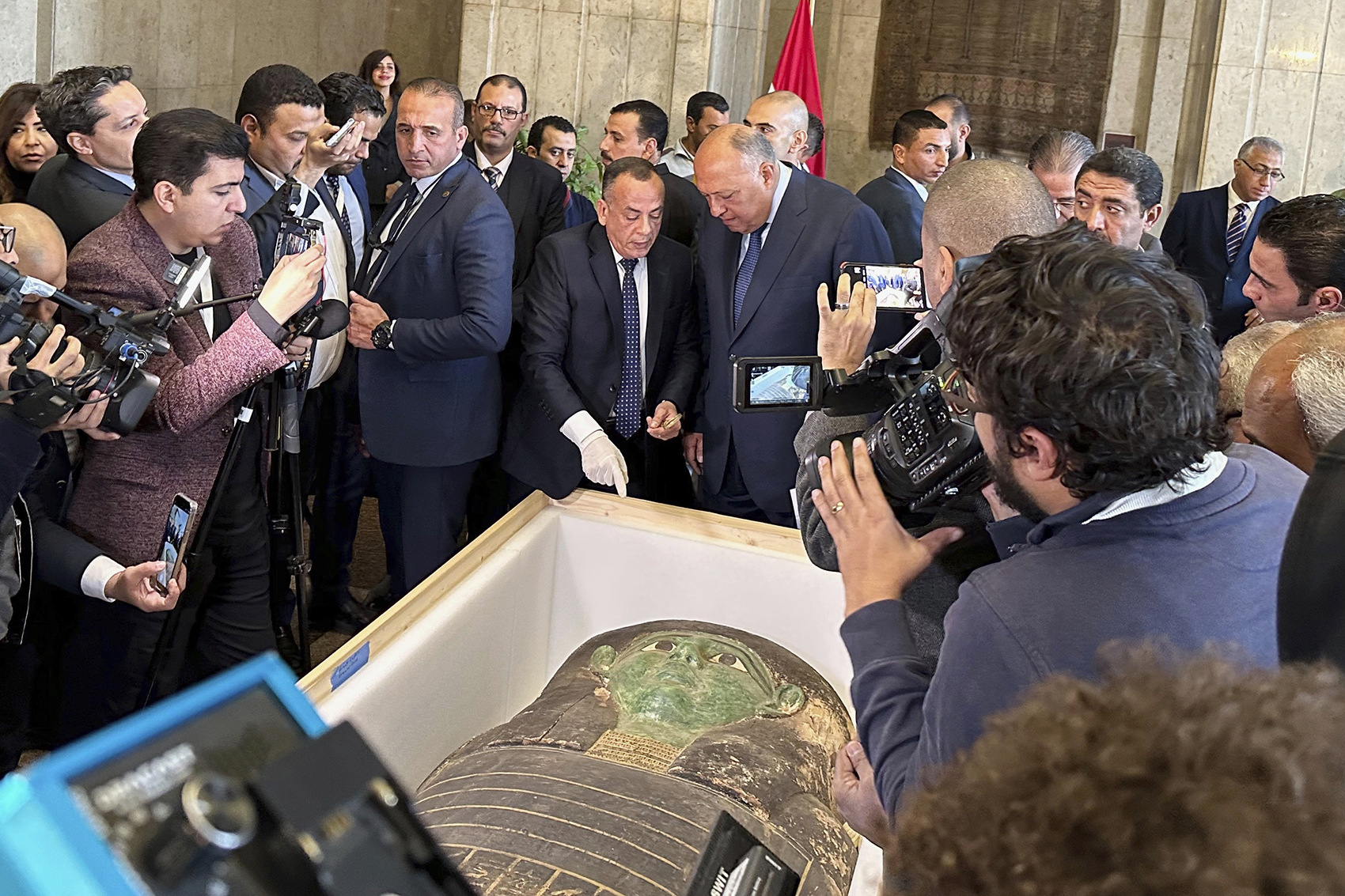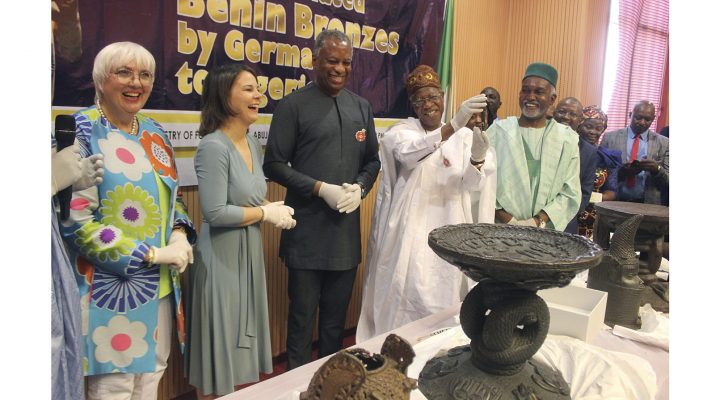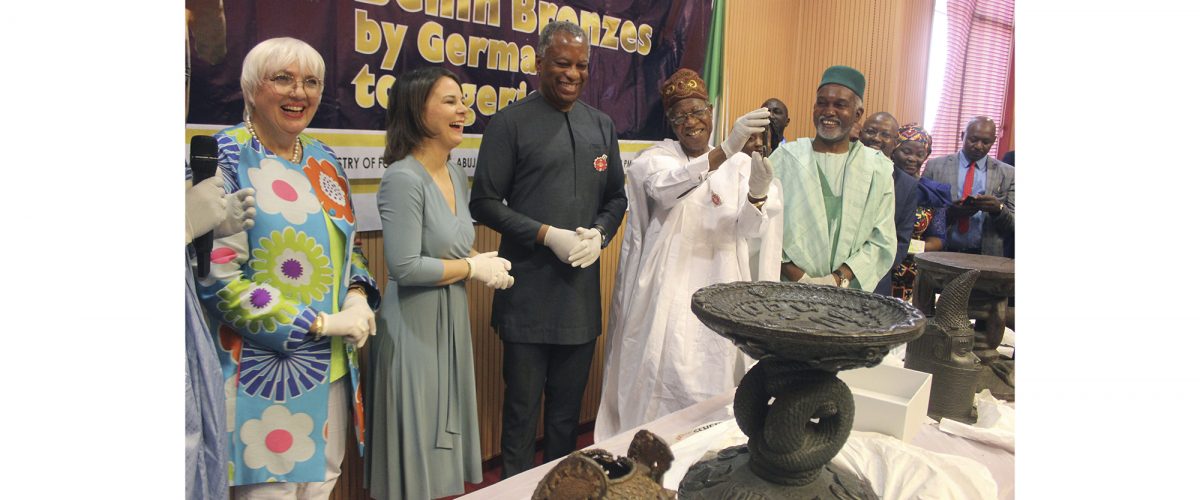In the last couple of years, many African countries have made strident efforts to retrieve artworks lost or looted from their domains by various merchants or colonial officials.
Over the last month, Nigeria and Egypt have recorded notable successes in this regard.
In December 2022, Nigeria took delivery of 22 Benin Bronzes returned to the country by Germany. Days later, the Houston Museum of Natural Science returned an artifact called the Green Coffin to Egypt.

Commemorative head of a king (Benin bronze), taken during the ceremony for the return of the Benin bronzes to Nigeria in Abuja, December 20, 2022. As part of the restitution, Germany returned numerous art objects that are considered looted art from the 19th century to the state of Nigeria. Federal Foreign Minister Baerbock, Minister of State for Culture Roth and directors of German museums, among others, traveled to the official handover. Photo by: Florian Gaertner/picture-alliance/dpa/AP Images
At a ceremony in Nigeria’s capital city, Abuja, German Foreign Minister Annalena Baerbock said: “It was wrong that these Benin Bronzes were stolen, and it was wrong that our country kept them. Even if the return cannot heal all wounds, it is an important step in coming to terms with Germany’s colonial past. We also want to face this part of our history.”
Baerbock’s counterpart, Claudia Roth, German minister of state for culture and media, said the gesture heralds a new turn in the relationship between Germany and Nigeria. Not only does the exchange connect “our two countries but also our continents,” she said. “It’s a good day when someone long gone returns to the place where they belong. It is a day of joy for us too.”
Regarding the Green Coffin, Sami Mesarwi, director of public relations for the Houston Museum of Natural Science, told BNG: “The Houston Museum of Natural Science was made aware of the circumstances regarding the Green Coffin by the New York County district attorney’s office. We fully cooperated with the office by working closely with Mr. Hosam Alkaweesh, consul general of Egypt in Houston, and his staff, and turning the artifact over to the government of the Arab Republic of Egypt. HMNS supplied all parties involved with any necessary information related to the artifact.”
He added the Houston museum “has never owned the artifact and was not involved with its removal from the Arab Republic of Egypt. As a courtesy, once we learned of the circumstances regarding the piece, we facilitated its immediate return. HMNS is fully supportive of repatriation efforts for antiquities illegally removed from their country of origin.”
Manhattan District Attorney Alvin L Bragg explained the background: “This stunning coffin was trafficked by a well-organized network that has looted countless antiquities from the region. We are pleased that this object will be returned to Egypt, where it rightfully belongs.”
Egyptian officials in the U.S., however, were not willing to speak on the subject. The Egyptian consulate in Houston and the Egyptian embassy in Washington, D.C., did not respond to BNG’s questions sent via emails and attempts to reach it via phone were unsuccessful too.
After the Green Coffin changed hands, it was on display in early January in Cairo, Egypt’s capital city.

Foreign Minister Sameh Shoukry, center right, and Mostafa Waziri, top official at the Supreme Council of Antiquities, talk in front of an ancient wooden sarcophagus during a handover ceremony at the foreign ministry in Cairo, Egypt, Monday, Jan. 2, 2023. An ancient wooden sarcophagus that was featured at the Houston Museum of Natural Sciences was returned to Egypt after U.S. authorities determined it was looted years ago, Egyptian officials said Monday. (AP Photo/Mohamed Salah)
Egyptian Foreign Minister Sameh Shoukry, in a report published by Aljazeera, said: “A precious piece of Egypt’s history was recovered after cooperation with our friends in the U.S., and after efforts that lasted for several years.”
The handover ceremony was attended by Daniel Rubinstein, the U.S. chargé d’affaires in Egypt, as well as Egypt’s minister of tourism and antiquities, Ahmed Issa.
Mostafa Waziri, an official of the Supreme Council of Antiquities, explained the sarcophagus’ origin dates to the Late Dynastic Period of ancient Egypt, a period from 664 BCE until Alexander the Great’s campaign in 332 BCE.
The return of these artifacts to Egypt and Nigeria is the latest fruit of a long-term campaign for art repatriation. In 2021 alone, Egyptian agencies reportedly took delivery of more than 5,000 artifacts from abroad.
Agitation for the return of Africa’s lost and stolen art works has transformed into a global movement involving not only government officials but African artists and art lovers, academics, students and other activists from within and outside the African continent. While some — such as French President Emmanuel Macron — have argued for the right condition to be created before prized artifacts are returned to their homes, some African activists believe it is not the place of foreigners to determine when or how such returns should happen.
Macron nonetheless commissioned a report to explore options. Benedicte Savoy, an art historian, and Felwine Sarr, economist, authored the report, which makes a case for the restitution of African art.
For now, the pressure continues to pile on. In addition to art being returned from the United States, others have been returned from Britain, France, the Netherlands, Scotland and Belgium.
In addition to art being return from the United States, others have been returned from Britain, France, the Netherlands, Scotland and Belgium.
“This debate has spanned decades, even during the days of active colonialism,” explained Victor Ehikhamenor, a Nigerian visual artist, in an interview with the Republic. “African communities have one way or the other asked for some of their very significant works of art looted or forcefully taken from them without adequate negotiations or compensations to be returned.”
He explained that “in the past four years or so, restitution requests have surged due to multiple factors. African artifacts looted, stolen, forcefully taken or however you want to put it belong to the African communities they were taken from in the Africa continent.”
These repatriations are not just economic in nature, Ehikhamenor said. “Works of art created by our ancestors are an important foundation for the contemporary African artist, either as a point of inspiration or a source of influence. If these looted works have influenced some of the old and even new canons of Western artists, you can imagine the importance of the artifacts to generations of African artists who have been denied access for centuries.”
He added: “The symbolic importance of their return to the rightful owners, beside the artists, is immeasurable. Many communities wrap their entire cultural cosmology around these works that were stolen. Can you imagine looting the religious artifacts that help strengthen the Christian faith from the Vatican?”
Anthony Akaeze is a Nigerian-born freelance journalist who lives in Houston. He covers Africa for BNG.
Related articles:
With pending return of Benin Bronzes, the Smithsonian approaches a more modern ethical standard


